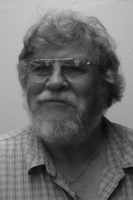Art DeVries
University of Illinois
Champaign, Illinois
United States of America
Art joined the Society for Cryobiology in 1984 and was elected to Fellow in 2020.
Biography
Dr. Arthur L. DeVries is an emeritus Professor of Evolution, Ecology and Behavior at the University of Illinois at Urbana-Champaign (UIUC), where he was previously a Professor of Molecular and Integrative Physiology and a Professor of Animal Biology. He received his B.S. in Zoology in 1960 from the University of Montana and his Ph.D. in Biology from Stanford University in 1968 and thereafter worked at UCSD and UC Davis before settling at UIUC.
Dr. DeVries was the first to discover the seemingly impossible properties of antifreeze proteins. His work was recognized by the American Association for the Advancement of Science, which made him a Fellow of the American Association for the Advancement of Science (AAAS), and by the National Science Foundation, which gave him the seventh position in their “Nifty 50” lineup of notable scientists on the occasion of their 50th anniversary in 2000.
He received the Lifetime Achievement Award at the First International Ice-Binding Protein Conference in 2011 as well as two awards from the Italian National Antarctic Programme and Italian Committee for Antarctic Research in 2005 and an honorary Doctorate of Science degree at Roskilde University in Denmark in 2014. He was chosen in 2015-2016 to give prominent lectures for the American Physiological Society, Novo Nordisk Foundation, and the Institute of Arctic Biology. He even had a new Antarctic fish, Paraliparis devriesi, named after him in 1980.
His work has received continuous funding from the NSF since 1971, and he has published 194 scientific papers on antifreeze proteins and given 61 invited lectures and seminars. His work has been cited over 9400 times and led to a large variety of derivative studies published in our journal, including studies on the facilitation of vitrification. Art’s discovery with Boris Rubinski and Amir Arav that AFPs stabilize membranes and block chilling injury has provided a new dimension to these molecules and another tool for applied research and was awarded a US Patent in 1994.
Art’s discovery of and further studies on antifreeze proteins and their properties and evolutionary origins and implications has forever changed our understanding of cold adaptation, ice physics, and membrane protection at low temperatures.
Services to the Society
Served on the Cryobiology Editorial Board from 1986-1990
Invited speaker to Society for Cryobiology Annual Meetings in 1984 and 1990.
Scientific Offspring
Art DeVries trained 18 graduate students (13 PhDs, 4 MS, 1 MD/PhD) and inspired multiple others, such as Gary Dobbs, Charles Knight, and Konrad Meister, in their pursuit of the study of AFPs.
Dr. John Duman - Professor Emeritus, Department of Biological Sciences, University of Notre Dame, USA
Dr. Jim Raymond – Adjunct Professor, Department of Life Sciences, University of Nevada, USA
Dr. Hans Ramlov – Professor of Comparative Animal Physiology, Department of Science and Environment, Roskilde University, Denmark
Dr. Krisztina Varga – Associate Professor, Department of Molecular, Cellular, and Biomedical Sciences, University of New Hampshire, USA
Dr. Joseph T. Eastman - Professor Emeritus of Anatomy, University of Ohio, USA
|